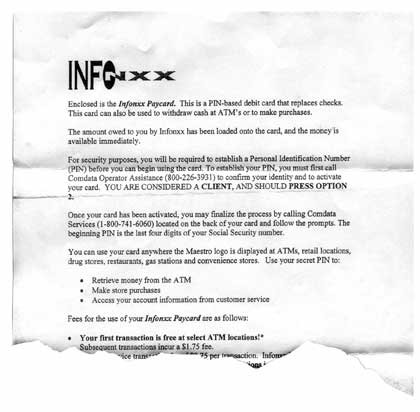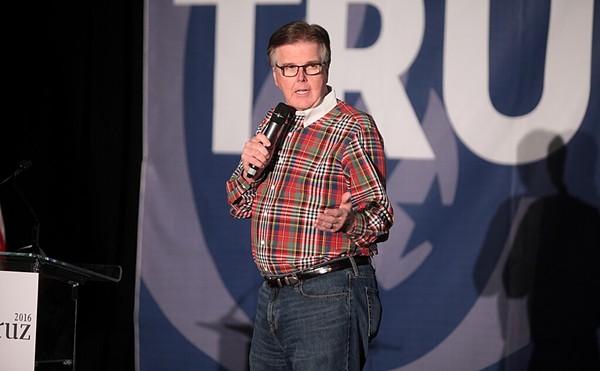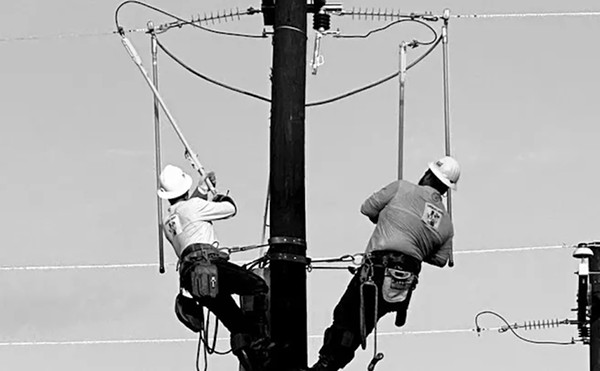Old-school paychecks at the INFONXX call center in SA have gone the way of the 8-Track
When Kristin Schimcek learned that her final paycheck from her old employer wasn’t going to be deposited directly into her bank account, she didn’t think much of it. Her name had been removed from the payroll system, she’d been told. But no one prepared her for what she found when she opened the envelope containing her final wages. It wasn’t a paycheck, at least not in the traditional sense. It looked like a credit card.
| Kristin Schimcek holds up the debit-card she received from INFONXX instead of her final check. |
“At first, I was like, ‘What the heck is this?’” she said. “I just wanted to go deposit a check.” Schimcek’s final pay came in the form of a Master Card-backed debit card. It looked convenient enough. Then she tried to access her money.
Traditional paychecks have gone the way of the 8-Track at INFONXX, an international call-center company that answers 411 calls from cell-phone users. About six months ago, the Bethlehem, Pennsylvania-based company, which fields more than 1.6 million directory-assistance calls a day, changed its payroll policy. The company all but eliminated traditional paper checks, said spokeswoman Maureen Pinchock.
“The reason for that was twofold. Primarily it was because a lot of the employees of these call centers did not have bank accounts ... So cutting them actual checks was very difficult, and, as you know, larger companies prefer direct deposit,” she said. “The other reason was that when people were actually cutting ... manual checks, they were easily duplicated and a lot of fraud had occurred in the past, and that was another reason why we went to the pay cards.”
The cost of investigating the fraud was racking up, Pinchock said, and the company found that it could save money by doing away with checks altogether. Now, INFONXX employees can have direct deposit or receive their pay via debit cards — but not checks. (“There have been instances in the past where they’ve had to cut manual checks, it just is a very tedious process because they have switched over to this debit-card system,” Pinchock said. “But it is possible to have manual checks cut.”)
While INFONXX is saving money by switching to the debit-card system, the employees who use them aren’t. Schimcek lost almost 3 percent of her paycheck to fees associated with using the card at an “in-network” ATM. Users pay a $1.75-transaction fee to use ATMs (after the initial transaction), and they pay 75 cents to swipe their cards at “point-of-sale” locations (anywhere you use your bank card and enter a PIN).
Not only did Schimcek lose $5.25 of her $189.78 paycheck to fees, but she also wasn’t able to withdraw the entire amount on the card because ATMs typically dispense in multiples of $10s and $20s. So three $1.75-transaction fees and a $180 withdrawal later, Schimcek had a debit card with a $4.53 balance.
INFONXX defends the cards and the fees. The company adds 75 cents to the card, intended to cover the first point-of-sale fee. That initial transaction at certain ATMs is free. But from then on, fees rack up.
Pinchock says the debit cards are an easy way for employees to access cash and it’s a safer payment method for the company, but she acknowledges that some employees might prefer a traditional paycheck. “It’s a double-edged sword,” she said. “It’s to protect some people. Some people might inadvertently be inconvenienced, so you can’t please everyone.”
Schimcek said she wasn’t too excited about using the ATM to retrieve her paycheck, and she definitely “wasn’t expecting to lose $5 on the deal.”
At first, the 26-year-old UTSA student wasn’t going to do anything about her final payment. But her boyfriend, John Strodtman, convinced her that it wasn’t right that she couldn’t have full access to what she’d earned.
| Kristin Schimcek holds up the debit-card she received from INFONXX instead of her final check. Below: a portion of a letter describing how she could access her money. |
“At first, she wasn’t upset at all, but I was,” Strodtman said. “It doesn’t promote savings at all. It promotes spending, and I see a problem with that.”
Strodtman said he and Schimcek aren’t upset so much about the $5.25 she lost to fees as much as they’re concerned about all the employees who may lose part of their wages because of INFONXX’s decision to forgo paper paychecks.
“Somebody else is getting richer off of their backs,” Strodtman said.
(INFONXX spokeswoman Pinchock said her company isn’t making anything off the fees card users pay. Those go to the banks and Master Card, she said.)
Strodtman called the Texas Workforce Commission, which is charged with enforcing state labor laws. He says he spoke to a hotline operator and asked whether Texas labor law addressed how workers are paid. “She said, ‘Honey, this is Texas. There ain’t no workers’ rights.’”
The Current contacted a spokesman from West Corporation, one of the largest telemarketing companies in the nation, and a local telemarketing consultant, both of whom said paying via debit cards definitely isn’t industry standard. The payment may sound fishy, but labor law experts said they were unsure whether it violated any state statutes.
Cynthia Hunter, deputy director of communications for the workforce commission, consulted with the agency’s in-house attorneys on the issue. “In this particular case, because she did not receive full payment under the law, and she did not agree to receive payment in the form that she did, she should file a wage claim with the TWC’s labor law department,” Hunter said. But even if Schimcek’s claim were successful it would not bring any sweeping changes, Hunter said. “They would address it specifically for her case. Each claim that would come in, in the future, would be addressed individually. It’s all based on the laws set by the legislature.”
But Schimcek’s complaint hasn’t gone unnoticed at INFONXX’s corporate offices. Pinchock says that the bigwigs in the corporate office don’t get day-to-day feedback from call-center employees, and that Schimcek’s feedback was beneficial. In response, she’d recommend to the higher ups that employees have the option of getting paper paychecks, at least in some cases.
For people like Schimcek, who left with a clear personnel folder, it might not hurt the company’s interests to offer paycheck choices, Pinchock said. “People who leave the company on good standing are the least likely to create fraud, so that might be a good option to let them have that on their own.”
4 PHRASES
... on your paycheck
Know how when you’re abroad you can politely shrink from a national dish (fried guinea pig!) or join your host family in wailing for a better American president, and all you need are a few useful phrases? (Like “I am not a conference delegate, nevertheless I would like a penguin” in German, “Ich bin kein Mitglied dieser Konferenz, dennoch möchte ich einen Pinguin.”) Well here are some suppertime sayings and non-jingoist jabber that you can use domestically. It’s “4 Phrases ... On Your Paycheck.”
1. Hurrah! This month, Congress gave itself another 2-percent automatic COLA (its 7th in a row, bringing the Congressional-minimum wage to $168,500), while voting to keep the federal minimum wage at a feeble $5.15, where it’s been since 1997.
2. The city agencies that receive tax revenue AND pay their employees at least $8.50/hour include the City of San Antonio, Bexar County, San Antonio Independent School District, and University Hospital System.
3. Texas payday law says if you quit, your last paycheck comes the next regularly scheduled payday; if you get the boot, it must come within six calendar days of said kicking. (For help, contact Texas Workforce Commission at (800) 832-2829 and/or get a lawyer).
4. Social Security (remember when that was the national debate topic du jour?) isn’t bankrupt like Bush says (although Boomers are indeed turning to stone with each passing day, and threatening to weigh the insurance system down); as Andrew Cassel writes in the Philadelphia Inquirer, raising retirement to 68, reducing SS payouts, and holding payroll taxes steady could make the system solvent (meaning more money coming in than going out). See aei.org and the Liebman-MacGuineas-Samwick Social Security Proposal.
Keli Dailey



















